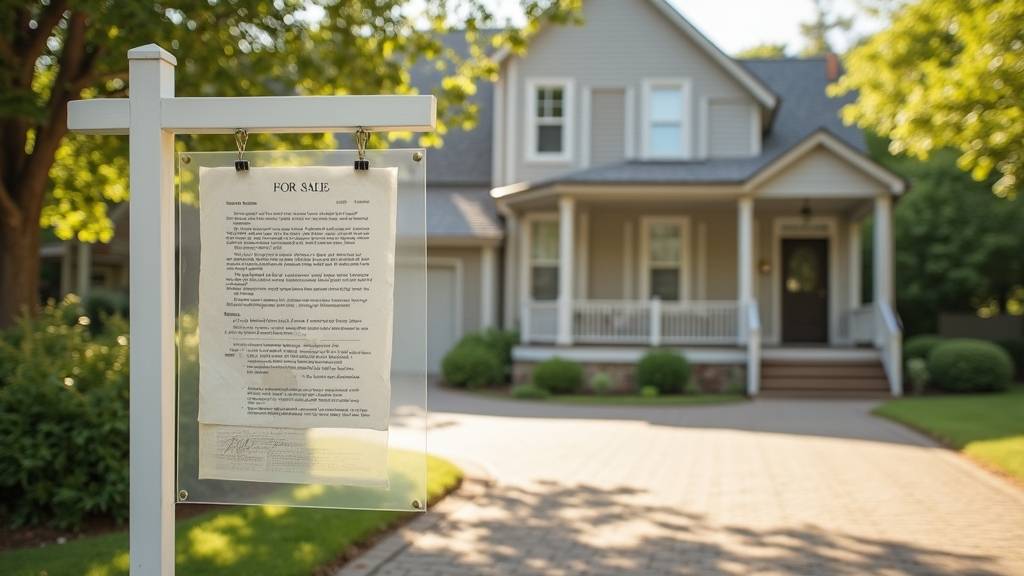Inheriting a home may seem like a blessing, but selling that property can be tricky. Probate can get in the way and make the process harder. Many people are surprised to find out that probate can stop a quick or easy sale.
This legal process can delay everything. Heirs may not agree, or debts must be settled first. You might feel stressed and unsure about what steps to take next.
Probate can complicate or delay the home selling process, but there are ways to manage it smoothly. Understanding how probate works will help you avoid mistakes and move forward.
Knowing the right steps makes the sale less stressful. This blog will guide you through the probate process and help you sell your inherited home with confidence.
Key Takeaways
- Probate is required to transfer ownership and sell a home if it was solely in the deceased’s name.
- The probate process can significantly delay a home sale, often taking several months to over a year.
- All debts, taxes, and title issues must be resolved through probate before the sale can close.
- Executor or court approval is needed to list, negotiate, and accept offers on the property.
- Heir disagreements or disputes during probate can further complicate and extend the selling process.
Understanding the Probate Process

The probate process begins when a person dies and their property must be managed or distributed. Probate is the legal way to settle a deceased person’s estate. It usually applies if there is property or money left behind.
The will, if there is one, must be filed with the local probate court. The court then appoints someone to manage the estate, called an executor or administrator. If there is no will, state laws decide who receives the property.
The executor must list all assets and notify creditors. Debts and taxes must be paid before any inheritance is given out. Real estate laws in your state affect how property is sold or transferred.
The court oversees the entire process to make sure all steps follow the law. Good estate planning can make probate faster and easier. If you understand probate, you can avoid mistakes and meet your legal duties. Probate laws influence how the estate is handled and how property is transferred during the process. Additionally, understanding property liens can help prevent delays or complications during probate, especially if there are encumbrances on the estate’s assets.
Determining If Probate Is Required
You must first find out if probate is needed for the property. Probate is usually required if the property was only in the deceased person’s name. If there is a named beneficiary, probate may not be necessary.
Check how the property was owned. Joint tenancy or a living trust often lets you avoid probate. A transfer-on-death deed can also transfer property without probate. Ownership matters—joint tenancy, a living trust, or a transfer-on-death deed can help you avoid probate for property transfers.
If the property does not have these features, probate is likely needed. You should read the will and check state laws. Some small estates can use a simple probate process.
Always confirm the legal steps for your area. If you are not sure, consider asking a lawyer. This can help avoid mistakes. Understanding property ownership types can significantly impact whether probate is required. Additionally, being aware of recent Virginia probate reforms may provide options to streamline the process.
Identifying the Executor’s Role in Selling the Home

The executor’s job is to manage the sale of the deceased’s home during probate. Executors must follow estate documents and probate tax rules. If you don’t follow these steps, you could face delays or tax problems.
Executors get court approval to sell the home. They hire a real estate agent and arrange for an appraisal. If you keep careful records, the process will go more smoothly. Proper documentation and understanding of local probate laws can help prevent legal complications during this process.
Here are the main duties for executors:
| Executor’s Task | Practical Consideration |
|---|---|
| Secure the property | Change locks, update insurance |
| Value the home | Hire an appraiser, note condition |
| Handle probate taxes | Pay capital gains, file taxes |
Clear communication with beneficiaries is important. If you have questions, consult with professionals. Staying organized helps protect the estate’s value. Properly handling these responsibilities can facilitate a smoother sale and avoid potential legal issues related to probate procedures.
Assessing Property Ownership and Title Issues
You must confirm who legally owns the property before you try to sell it. Clear title is necessary to avoid delays in the sale. If ownership is uncertain, you may need legal guidance.
Start by getting a copy of the property deed. Review the deed to see whose name is listed as the owner. If someone else is on the title, consult the probate court or a lawyer. Ensuring that the property has a clear title can prevent complications during the sale process.
If there are any liens or unpaid mortgages, address them early. Disputes among heirs can also create problems. Resolve these issues before listing the property for sale.
To make the process smoother, follow these steps. First, check the deed for ownership information. Next, seek advice for joint tenancy or trust matters, and fix any title issues in court if needed. Conducting a thorough title search can help identify liens, claims, or disputes that might complicate the sale process.
Getting the Home Appraised for Probate

You must get the home appraised to determine its value for probate. The court will need an accurate appraisal to set the property’s fair market value. A licensed appraiser with probate experience should be hired for this task. Ensuring the appraisal accounts for any foundation issues and related issues can help prevent delays and legal complications. Prepare the home by making small repairs and removing clutter.
Home staging and simple updates can help the property look its best. If you use professional real estate photos, appraisers can see the home’s features more clearly. You should also gather all important documents about the home. These may include repair records, previous appraisals, or improvement receipts. Good organization can make the appraisal process faster and smoother.
Navigating Court Approval for the Sale
The court must approve the sale before you can complete a probate property transaction. This step protects the estate’s value and ensures state laws are followed. If you skip this, the sale cannot move forward.
You must show the court the signed purchase agreement and a recent appraisal. If the judge needs more information, a hearing may be scheduled. The judge will then decide if the sale price is fair. To facilitate a smooth process, working with an experienced attorney can be highly beneficial, as they are familiar with court approval procedures.
If approval is granted, the court issues an order to proceed. You can only close the sale after receiving this order. If you work with an attorney, the process is usually smoother and faster.
Being aware of common court procedures can help you prepare for potential delays or additional documentation that may be required during the probate sale process.
Handling Multiple Heirs and Disagreements
When multiple heirs are involved, you’ll need a clear strategy to reach consensus and prevent disputes over the sale. Address disagreements early, as unresolved conflicts can stall the process and extend the probate timeline. Prioritize open communication and, if needed, seek mediation to keep the sale on track.
Understanding property classification and legal guidance can also help clarify rights and responsibilities among heirs. Additionally, being aware of tenant rights and proper legal procedures can facilitate smoother negotiations and reduce potential conflicts during the sale process.
Reaching Consensus Among Heirs
Multiple heirs must agree to sell a home during probate, which can be challenging. Disagreements often come up about the property’s value and when to sell. Clear steps can help everyone reach a decision together.
If heirs want to avoid confusion, they should meet to discuss their goals and concerns. A family meeting allows each person to share their views openly. This helps everyone understand each other’s priorities.
A professional can provide a fair value for the estate if there is disagreement. An unbiased estate valuation can settle arguments about the home’s worth. This makes it easier to agree on a selling price.
If heirs struggle to coordinate, they should appoint one trusted person to lead. The executor or a chosen representative can manage communication. This keeps the process organized and fair for everyone.
Resolving Inheritance Disputes
Resolving inheritance disputes is important for a smooth probate process. Heirs often disagree about property value or when to transfer the title. If you address these issues early, you can prevent bigger problems.
Estate valuation must be accurate to avoid conflict. Clear numbers help everyone see the property’s real market value. This can make discussions about fairness easier.
All heirs usually need to agree before you sell the property. If some do not agree, legal help might be necessary. Legal action adds cost and can slow everything down.
Good communication is key in these situations. You should document every decision and update all parties regularly. If needed, professional guidance can help resolve issues faster.
Impact on Sale Timeline
Multiple heirs and disagreements can make selling a home take longer. Each person must agree before making any major decisions. This often slows down the sale timeline.
If heirs cannot agree, legal action may become necessary. The court process can pause or extend the home sale. This adds more time to the process.
Managing the property may also cause delays. Heirs often argue over repairs or tenant issues. These disputes can further slow down your sale.
If you communicate clearly, you may avoid some delays. Mediation is another option if discussions stall. Taking these steps can help keep things moving.
Managing Debts and Liens on the Property
Before you sell a probate property, you’ll need to identify any outstanding debts, including mortgages and tax liens. Clearing these obligations is crucial, as they must be satisfied or negotiated before closing. By tackling these issues upfront, you prevent costly delays and ensure a smoother transaction. Additionally, conducting a thorough title search helps uncover hidden liens or judgments that could complicate the sale process.
Identifying Outstanding Property Debts
To sell a probate property, you must first find all debts and liens on the home. If you miss any, the sale can be delayed or stopped. Always check for these before moving forward.
A title report will show liens, judgments, or unpaid taxes. Estate records may reveal unpaid bills or fees. These include utilities, contractor charges, or homeowner association dues.
If you are unsure, consult a probate attorney or real estate agent. They can help list and sort all debts. This ensures you do not overlook any claims on the property.
Resolving Mortgage Obligations
You must resolve mortgages and liens before selling a probate property. Start by asking the mortgage lender for a payoff statement. This shows the exact amount needed to pay off the mortgage.
Check the property’s title report to find any liens, such as unpaid bills or court judgments. If there are liens, contact each lienholder to discuss payment or release. Liens must be cleared so you can transfer a clean title to the buyer.
Keep receipts and documents showing payments or lien releases. Buyers and their lenders will need proof that the title is clear. If you handle these steps early, you can avoid delays during the sale process.
Addressing Tax Liens
Tax liens must be handled before selling or transferring property. These liens can delay probate and prevent a sale if not resolved. Buyers and title companies need a clear title to complete the process.
First, you should find out if there are any tax liens on the property. If you find one, request a payoff statement from the tax authority. This statement will show the total amount owed.
If the estate has enough funds, use them to pay the lien. Otherwise, you may need to negotiate a payment plan or settlement. Always keep records of any payments made.
After paying off the lien, ask the tax authority for a lien release. This document proves the debt is cleared. You must provide this release to buyers and title companies.
Dealing With Probate Timelines and Delays
Probate can take several months to over a year. Delays often happen if paperwork is missing or if there are disputes. Courts may also be slow because of busy schedules.
If documents are not accurate or creditors make claims, the process may stall. Heirs who challenge the will can also cause delays. Quick responses to court requests can help keep things moving.
Keeping organized records is important for avoiding setbacks. If selling a home depends on probate, talk to your attorney about speeding up the process. Good estate planning can help your family avoid these delays in the future.
Being informed and prepared makes probate easier to handle. If you take action early, you may save time and avoid stress. Simple steps can prevent unnecessary frustration for everyone involved.
Preparing the Home for Sale During Probate
You’ll need to start by thoroughly assessing the property’s condition to determine what’s required to attract buyers and maximize value. Carefully sort and remove personal belongings, keeping in mind legal obligations and sentimental considerations. Prioritize essential repairs, as addressing these issues early can prevent complications during the sale and help you achieve a smoother transaction.
Assessing Property Condition
Before selling a probate property, you must check its condition carefully. This helps you know what repairs are needed. If the home has problems, fixing them can make it easier to sell.
A good assessment covers the structure, main systems, and how the house looks. Homebuyers may avoid properties with obvious issues. If you address these early, you protect the home’s value.
Consider hiring a professional inspector to find hidden problems. Make repairs that are affordable and improve first impressions. If you stage rooms and use good photos, more buyers may show interest.
This process can help you sell the house faster. It also helps you avoid surprises during the sale. Careful planning makes the selling process smoother.
Handling Personal Belongings
When preparing a probate home for sale, you must handle personal belongings carefully and legally. Start by making a complete list of everything in the home. This helps prevent family disagreements and meets legal requirements.
If there is a will or court order, check which items go to beneficiaries. Remove these items first and keep clear records. You should secure any sensitive documents before moving other things.
For things that remain, you may donate, sell, or throw them away if allowed. Always follow probate rules when removing items. Clearing out the home helps make it ready and attractive for buyers.
Addressing Necessary Repairs
Addressing necessary repairs is important when selling a probate property. Repairs help increase the market value and attract more buyers. Begin by inspecting the property to find all major and minor issues.
Structural repairs should come first if you find problems like roof leaks or faulty wiring. Safety hazards must be fixed to avoid scaring away buyers. If these are ignored, the sale may not go through smoothly.
Cosmetic updates can make the property look more appealing. Fresh paint and new carpet can create a clean, inviting space. Simple changes often have a big impact on buyer interest.
Landscaping also matters if you want a good first impression. Trim bushes, mow the lawn, and plant flowers to boost curb appeal. Well-kept yards can increase the home’s perceived value.
Marketing a Probate Property
Marketing a probate property means using special methods to sell a home from an estate. Buyers should know the property is in probate, which may affect the sale. A clear approach helps attract the right buyers and builds trust. Selling a probate property requires targeted marketing so buyers understand the process and are confident in the sale.
Digital advertising is important because it reaches people looking for estate homes. Professional photos make the listing more appealing. If you use strong descriptions, the home stands out online.
Work with real estate agents who know probate sales. These agents understand the legal steps and the best ways to market the home. If you choose an experienced agent, the process can go smoothly.
Professional staging can help buyers see the property’s value. Agent networks connect you to buyers interested in probate properties. Detailed disclosure documents can increase buyer confidence.
If you follow these steps, you can get more interest in your probate property. Careful marketing gives your listing a better chance of selling.
Accepting Offers and Negotiating Terms
As the executor, you’re responsible for reviewing offers and ensuring they align with the estate’s best interests. You must understand when court approval is needed before accepting any terms, as probate sales often come with strict legal requirements. Be aware of negotiation limitations, since some concessions or contingencies common in standard sales may not be permitted during the probate process.
Executor’s Role in Offers
As an executor, you must carefully review all offers for the probate property. Your main duty is to protect the estate’s interests and follow legal instructions. If you receive an offer, you should compare it to the property’s market value and appraised price.
You should look at each offer’s price, conditions, and the buyer’s ability to pay. If any offer does not meet the estate’s needs, you can reject or negotiate it. Make sure every decision benefits the heirs.
If you are unsure, consult the estate attorney and real estate agent. Their advice can help you follow the law and estate plans. If beneficiaries have questions, explain your choices clearly to avoid misunderstandings.
Court Approval Requirements
You must follow special steps when accepting or negotiating an offer on a probate property. The probate court must approve all offers before you can move forward. If you skip this step, the sale may not be valid.
The executor or administrator needs to collect all required documents. These should include the accepted offer and any supporting paperwork. You must then submit these to the probate court for review.
The court will check if the offer is fair and matches the property’s market value. If the court approves, you can continue with the sale process. Consult a probate attorney if you are unsure about any step.
Careful estate planning can make this process easier. If you follow legal requirements closely, you can avoid delays. Always check local probate laws for specific rules.
Negotiation Limitations Explained
Negotiating the sale of a probate property comes with specific restrictions. These rules are stricter than in normal home sales. You must follow court rules and protect the estate’s interests.
Court approval is often required before accepting an offer. This can make the process slower and less flexible. If the court must confirm the sale, you cannot quickly change your mind.
Probate sales also limit changes to terms like price, closing dates, or contingencies. The court usually sets the property value. You must stick to this value when negotiating.
Offers may be presented in open court. If someone makes a higher offer, it could replace your original deal. This process reduces private negotiations.
Closing the Sale Through the Probate Court
To close a sale through the probate court, you need the court’s approval. This step is required before the sale can finish. The court checks that everything follows the law.
You must file a petition showing the sale terms and buyer’s offer. Heirs and creditors must get notified so they can object if needed. The court reviews if the sale follows legal rules and meets fair market value.
If you do not follow deadlines or requirements, the court may reject the sale. Good record keeping helps this process go smoothly. If the court approves, you get an order to complete the sale and transfer ownership.
Distributing Sale Proceeds to Beneficiaries
After the court approves the sale, send the money to each beneficiary as the will or law directs. Pay all estate taxes before giving out any funds. If you skip this, you could face legal problems.
The executor checks the will or state law to see who gets what share. Each beneficiary’s rights and amounts must be clear. Proper review helps avoid mistakes.
The executor gives each beneficiary a detailed report of the sale and all deductions. If any beneficiary asks, provide proof of each payment. Record every transaction to keep the process transparent.
Conclusion
If you need to sell a home during probate, understanding the process can make things easier. If you follow each step carefully, you can avoid delays and common mistakes. If you have questions, you should always seek professional advice.
If you want a simple solution, we buy houses for cash in any condition. If you choose Align Real Estate Solutions, we can help make the probate sale quick and stress-free. If you want to save time and avoid hassle, a cash sale is a good option.
If you are ready to move forward, we are here to help every step of the way. If you contact Align Real Estate Solutions, we will guide you through the process. If you reach out today, we can provide a no-obligation offer and answer all your questions.
Author
-

Zach Koops is co-founder and Real Estate Success Manager at Align Real Estate Solutions, serving homeowners across Virginia since 2024. With a passion for real estate and a heart for people, Zach has built his career around helping sellers navigate tough situations—foreclosure, inheritance, relocation, repair-overload—with clarity and compassion. He’s known for being straightforward, steady under pressure, and deeply invested in relationships. Outside of work, he spends his time as a husband and father, enjoys the outdoors in Shenandoah Valley, loves singing on stage, and constantly seeks growth through reading and new experiences.









